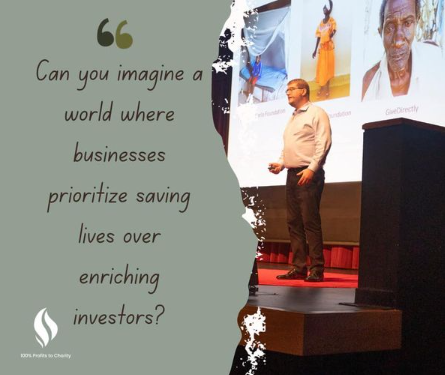Last month, I attended a preview screening of the thought-provoking film Uncharitable. Based on Dan Pallotta‘s 2013 TED talk, this powerful movie challenges our understanding of charity and philanthropy, prompting us to all rethink how we can solve global problems.
As someone deeply committed to making a difference, I reflected on how Uncharitable aligns with the work we do at The Life You Can Save.
At The Life You Can Save, we are dedicated to maximising our own resources and those of our donors. One of our key services is conducting due diligence and independent evaluation of charities working in low-income countries. We provide a vetted list of high-impact, cost-effective nonprofits for donors to access. However, it’s important to acknowledge that our skilled research team and our fundraising and marketing team come at a cost. As an organisation, we have multiple overheads that are necessary for us to function and work towards our goal of ending global poverty.
That’s why it was inspiring to see the film Uncharitable challenge the perception that overhead is unnecessary. In reality, overhead, including salaries and administrative costs, is essential for nonprofits to pursue systematic solutions and bring them to scale. Major investments in overhead help drive meaningful change and create a lasting impact on the lives of those in need. By providing unrestricted funding to charities that empower them to invest in infrastructure, capacity-building, and marketing efforts, we can unlock their potential to reach more people and bring about enduring change. It is also crucial to recognise that adequate resources are necessary to attract top talent, implement effective campaigns, and take calculated risks.
Imagine the impact nonprofits could have if we had greater funding for additional skilled staff, technology, and bigger and better outreach initiatives. By funding overhead, donors and philanthropists give nonprofits the opportunity to scale operations, reach more communities, and drive high-impact change.
It’s unacceptable for cosmetic company CMOs to earn 3x or 10x more than nonprofit CMOs simply because outdated perceptions demand that the altruistic nature of nonprofit work should form part of their compensation. As Pallotta argues, “Our generation does not want its epitaph to read, ‘We kept charity overhead low.’ We want it to read that we changed the world.” We need to reevaluate our perspective on overhead and embrace a holistic approach that recognises the significance of effective business management.
Thanks to the Social Impact Hub and The Funding Network Australia for the pre-screening, and to the donors contributing towards the impact campaign to spread the important message of Uncharitable. Be on the lookout for more screenings of this important documentary later this year.



